
Climate change is an acute threat to the eradication of poverty, with the poorest regions of the world to be hardest hit. Without rapid, inclusive and climate-informed development, climate change will force 100 million people into poverty by 2030. The World Bank's new report, "Shock Waves: Managing the Impacts of Climate Change on Poverty", shows how climate change represents a significant threat to the sustained eradication of poverty, but that good development policies can prevent most short-term impacts whereas immediate pro-poor emissions-reduction policies can drastically limit long-term ones.
On 24 November 2015 (3:00 PM CET), the GGKP hosted a webinar exploring how these two objectives of ending poverty and stabilizing climate change can be more easily achieved if considered together. The webinar was moderated by Carlo Carraro (Co-chair of the GGKP Advisory Committee) and featured a presentation of the new World Bank report by one of the authors of the report, Stephane Hallegatte (Senior Economist, Climate Change Group, World Bank). Paul Ekins (Director, Institute for Sustainable Resources, UCL) and Simon Anderson (Head, Climate Change Group, IIED) served as discussants. The panel discussion was followed by a moderated discussion with the audience.
Speakers listed below are shown here form left to right.
Moderator: Carlo Carraro, Vice-Chair, IPCC WG III and GGKP Advisory Committee
Presentation by: Stephane Hallegatte, Senior Economist, Climate Change Group, World Bank
Discussants:
WEBINAR SLIDES
WEBINAR RECORDING


